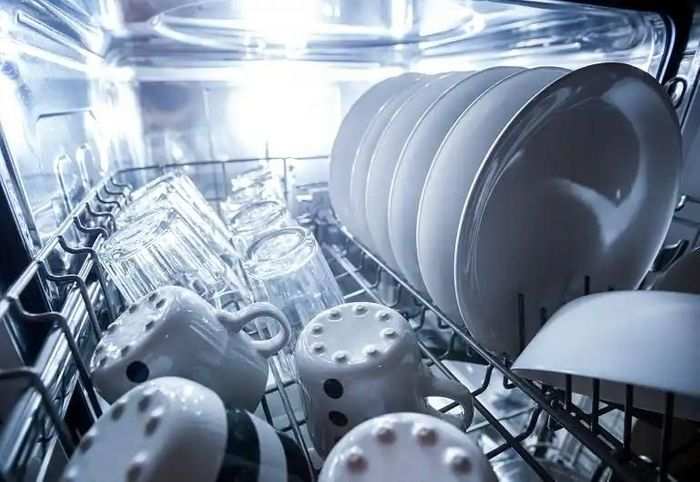
Hard water can be harmful to your dishwasher’s overall performance. Using hard water leads to spotting in your dishes and rusting to the metallic racks of your dishwasher. Today we look at the systematic procedure that you can use to clean the hard water off your dishwasher
Causes of hard water
Hardness in water is due to high mineral composition, i.e., calcium. When used, it tends to leave behind a trace lime scale residue. The hardness of water is calibrated in parts per million, whereby for water to be termed harmful hard water, it has to have a mineral content of 100 and above ppm.
Hard water occurrence is beyond a human cause as the geographical mineral composition determines the nature of the water. Hard water can be used for drinking and washing, although it has a weird salty taste. The buildup of minerals tends to damage any materials it comes into contact with for an extended period. The same applies to the dishwasher, which may prove too costly to control.
Effects of hard water on a dishwasher
Hard water elements prove to be catastrophic as it reduces performance. Its effects include:
- A cloudy and foggy effect on glassware dishes – the lime scale causes chalky water spots on clear glassware. It also leaves a chalky feeling when touched
- Defective heat element- the same residue also affects the heating element of your dishwasher. It leads to the development of a coat covering the heating element that leads to lower temperatures reducing the solubility of the detergents causing further problems
- The Rusting of the dishwasher elements – dishwasher racks are made up of metal that, when exposed to high levels of salt concentration, lead to rusting. Rust causes the dishwasher to lose its functionality, as it cannot handle the weight of the dishes.
- Dishes are not getting clean – hard water causes clogging of the sprayers; thus, proper cleaning of dishes does not happen, as it should. The dishes come out with food particles on them.
How to clean hard water from a dishwasher
Cleaning off hard water effects from your dishwasher is something that can be achieved in various ways, as discussed below:
1. Use of vinegar wash
Immediately you notice the formation of film or chalky residue on your utensils; then, the vinegar wash is the most appropriate solution. Place the dishes with the chalky residue in the dishwasher, then put two-500mL cups of white vinegar in a bowl and place it on the lower rack. Run a full cycle wash of the dishwasher with no detergent. Rewash with a cleaner to remove the residual vinegar
The vinegar wash contains an acid that breaks down the chalky scale, making it possible for the hot water to wash it away.
2. Use hard water detergent
Hard water reduces the lathering ability of water, making it difficult for soap to sud, reducing the effectiveness of the detergent. The hard water detergent is explicitly structured to tackle the hard water dishwasher loads to get the job done
3. Wipe sprayer arm with vinegar
Wiping the sprayer solves the problem of clogged holes, reducing the dishwasher’s efficiency. Hard water causes a scale buildup that clogs the sprayer arms inhibiting its ability to clean the dishes.
Wiping the sprayer arms removes the clog formed on the holes by the scale buildup. Immerse a cloth in white vinegar and gently wipe the sprayer arms until all the accumulation is no more. Continue to run a cycle of the dishwasher while empty with vinegar to access any hard-to-reach clogs.
4. Replace the damaged parts
The rust caused by the continuous use of hard water can prove difficult to clean. It is highly advisable to replace the damaged parts as brushing or scrubbing of the parts causes further damage, which leads to a drop in tensile strength.
Signs that your dishwasher has hard water
Sometimes everything might be running smoothly, but the dishes do not come out as clean as they should. Below are some signs to look out for to see if hard water is running through your dishwasher:
- Formation of cloudy spots on your dishes
- Food residue on your dishes after a cleaning cycle
- Rust formation on metal components
- A harsh metallic smell from already cleaned dishes
- If you notice that you use a high amount of detergent to achieve maximum results
- Formation of soap scum
- A chalky residue inside your dishwasher
Preventive measures to tackle hard water on a dishwasher
Prevention is better than cure; with prior knowledge of the presence of hard water, it is good to create measures to prevent the destruction of your dishwasher. When installing your dishwasher in a hard water system, consider applying the actions below to control the effects of hard water.
1. Install a water softener
Home water softener units convert hard water to soft water by striping the minerals out of the water. Installing a water softener can be cost-effective as it inhibits all damages caused by hard water.
2. Use of hard water detergent
Effects of hard water come up because the soap functions are significantly repressed. Hard water detergent has a specific molecular structure to counter the lathering co-factor that the hard water presents. Hard water detergent provides more soluble abilities that enables the soap to clean the dishes as needed effectively.
Conclusion
Hard water is a major inhibitor to dishwasher effective functioning. Cleaning your dishwasher off the hard water could not only be cost effective but also improve your dishwasher performance. Always remember that it is not your dishwasher at fault but the hard water running through it.
Identifying and tackling hard water symptoms will help you preserve the life of your dishwasher. Following the directions stated above will help you conquer and fully solve all your dishwasher problems and prevent future hard water problems.
